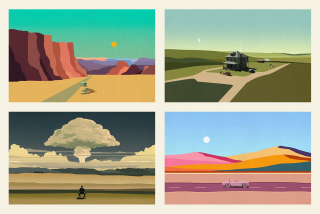McMurtry on the Trail of ‘Dove’ Again
- Share via
Larry McMurtry’s Pulitzer Prize-winning novel “Lonesome Dove,” now an eight-hour miniseries starting Sunday night on CBS, began life as a film script that was to star John Wayne, Henry Fonda and James Stewart.
“It wasn’t about a cattle drive,” McMurtry said in Los Angeles last week, “but about three old cowboys having their last great adventure.” The year was 1971 and McMurtry had been working with Peter Bogdanovich on the adaptation of McMurtry’s “The Last Picture Show.” Bogdanovich was to do the new film. But Wayne didn’t want to make the movie and the project lapsed.
Later in the ‘70s, McMurtry three times started to do the story as a novel but abandoned it. The fourth time was the charm and he finished it--now a 2,000-page manuscript about a cattle drive from the Rio Grande to northern Montana in the 1870s. He bought the original property back from Warner Bros., and the book, published in 1985, became a best seller, described in this newspaper as “a masterful and compelling epic.”
McMurtry was in Los Angeles last week to speak at the Pasadena Public Library and to scout Orange County for a location for the latest in his chain of antiquarian book shops. He has others in Washington, Dallas and Houston. “I’m on the Atlantic and the Gulf,” McMurtry said at breakfast. “I’ve always wanted to be a tri-coastal bookshop.”
He got into the book trade while he was still a student, as a scout haunting junk shops and charity sales, buying books to sell to established dealers. (He wrote about the life in another of his novels, “Cadillac Jack.”)
“It was a way to finance my reading,” McMurtry says. “One of the reasons I have so many bookstores is that the book-hunger of growing up in an essentially bookless place (Archer City, Tex.) has never left me. I don’t want to be without books again, so I have 100,000 or so.”
As McMurtry told his Pasadena audience, some 10,000 of the 100,000 books he has are what he thinks of as his very own, at home in Washington, waiting to be read or re-read.
He has chosen Orange County as his next location, he says, to be a bit away from what he calls the force-field of Los Angeles dealers, but within range of both Los Angeles and San Diego. He also already has friends who will manage it. “I always choose the place after I have someone to run the store.” Interestingly, he thinks Orange County will be a fertile place to buy books. “You can sell books anyplace.” Many of his books are sold in Britain and Europe.
McMurtry, 52 this year, is bi-coastal in appearance--Western boots and blue button-down shirts. There are few traces of Archer City in his well-modulated voice and with his horn rims, longish hair and affably pleasant appearance, he suggests a popular professor at a very good college.
His easy-going demeanor is more than mildly deceiving. At 8:30 in the morning he announces he has finished his daily quota: five pages of manuscript, executed on a quite traditional manual typewriter.
“I do more pages if it’s a film script, fewer if it’s an essay, but five pages of fiction. I’m a fairly rapid writer; I really only need about an hour and a half to make the quota. I’m also an early riser and I’ve always had a lot of physical energy.”
By 9:30, he is charging into the rest of his life. He could write more on some days but rations himself, to be sure he doesn’t find the next day that the well has gone dry.
The antiquarian book-buying and selling are an ideal complement to the writing. “Teaching and writing make the same kind of emotional demands on you. Book selling makes physical demands--moving them around. It’s also progressive in the sense that you get better and better, while you may get worse and worse as a writer.
“But the more books you handle, the more you know. It’s educative; you’re constantly having to learn.” McMurtry is blissfully eclectic. “We deal in whatever interests us; any period, any subject, any language.”
Curiously, although McMurtry has written about the Old West and the contemporary West as well as any author in his time, the literature of the West interests him least, because, he says, so much of it is not very good. “Miles and miles of junk, a lot of it.”
There are exceptions. A book by the 19th-Century American geologist Raphael Pumpelly, “Across America and Asia,” is one of the best accounts of the Southwest that McMurtry knows and there are scenes inspired by the book in both “Lonesome Dove” and McMurtry’s latest novel, “Anything for Billy,” a fictional speculation on the brief life of Billy the Kid, as narrated by a dime novelist.
McMurtry grew up in cowboy country in West Texas, his father one of nine brothers who all did some cowboying and to whom “Lonesome Dove” is dedicated. They were all just a little too young for the long, epic cattle drives that McMurtry celebrates in the novel, but they had heard the stories firsthand, and McMurtry told his Pasadena audience that he had heard them in his turn.
The research for the novel was largely memory and imagination, and he confessed that there were some historical goofs, most notably ignoring the railroad. “I made a penciled note in the margin about pushing the herd across the tracks in a dust storm,” he said, “but I forgot to do it.” (In the miniseries, the railroad is present, but only as a lonely whistle off-camera in Ogalalla.)
The book-dealing is obviously an excitement and a satisfaction in itself. You have the feeling McMurtry might have made a pretty fair horse trader if he’d stayed on the ranch, although he says he was an early failure as a cowboy, because unlike his father and uncles, he could never tell one cow from another.
Yet the other life can also be seen as McMurtry’s hedge against his awareness that the creative well can indeed go dry. “I lost my conviction in 1975 in the middle of ‘Terms of Endearment’ and I didn’t recover it for nine years.” He found pleasure again in writing “Desert Rose,” a short novel about a woman in Las Vegas that grew out of an assignment to do a piece about showgirls.
He writes a long first draft, then a second when he takes out “the redundancies and the bad guesses,” and finally a third for polish. He seldom has more than a generalized intention. In “Terms of Endearment,” it was simply to see if he could get inside the mind of a 50-year-old woman. The book reveals itself to him as he proceeds--if it’s going to.
He is currently writing “My Girl Friend’s Boy Friends,” set again in contemporary Texas and a sequel to “All My Friends Are Going To Be Strangers.”
“I’m 300 pages into it and now I know what it’s about,” he said in Pasadena. He will then do a novel based on Calamity Jane.
“The thing I’m most afraid of,” he says, “is self-repetition. . . . Art is not progressive. You may have a good 10 years and then lose it. You have to keep struggling with it. I’d abandoned ‘Lonesome Dove’ three times. Now,” he says with a grin, “it seems to be replacing ‘Gone With the Wind’ as a national epic.”
The trouble, he says, is that after the early years of reading thousands of novels, “You are forced to read only one writer every day of your life--yourself.” The fear is that the sentences will come to seem “leaden and hauntingly familiar.”
A worse problem is having written your best book first, as James Jones and other writers have done, in McMurtry’s view. It is a problem he avoided, he says, although his first book, “Horseman Pass By,” became the movie “Hud.”
In his early days he took jobs in grocery stores to earn the little money he needed to live and write. In a sense, nothing has changed. “I can’t be threatened by anything except the failure of my own will, intellect and imagination.”
And when it’s all working, “I enjoy the constant excitement of seeing what my imagination will produce.” He doesn’t look back, he says. “When I finish a book, I release it. It’s not mine anymore; it belongs to the readers.”
He had nothing to do with the “Lonesome Dove” miniseries and he’ll wait a while to see it. He’s had very good luck with the performances in all the films based on his work and only one, “Loving Molly,” the adaptation of “Leaving Cheyenne,” went seriously wrong.
“Probably impossible to do anyway because of the long time span. But I think it took 10 years off my father’s life. Tony Perkins was the principal cowboy in the picture, and when he showed up in a farmer’s bib overalls--oh, my.”
More to Read
Sign up for our Book Club newsletter
Get the latest news, events and more from the Los Angeles Times Book Club, and help us get L.A. reading and talking.
You may occasionally receive promotional content from the Los Angeles Times.








